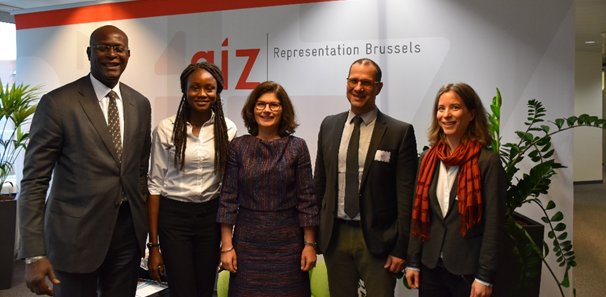The role of digitalisation in creating employment prospects for Africa’s youth
On 5th of March 2020 UNICEF, Orange and the GIZ Representation Brussels hosted a high-level breakfast on youth empowerment and digital inclusion in Africa.

On 5th of March 2020 – four days before the EU’s comprehensive strategy with Africa was published – UNICEF, Orange and the GIZ Representation Brussels hosted a high-level breakfast on youth empowerment and digital inclusion in Africa. Around 45 representatives from the EU Commission, permanent representations to the EU, implementing agencies, the private sector and several youth representatives participated in the event and contributed to a lively discussion on quality education and digital inclusion in Africa.
Participants were encouraged to share their experiences and insights, and engage in the discussion led by the following main speakers:
- Zainab Sunmisola Yunusa, youth activist from Nigeria
- Andreas Jacobs, Permanent Representation of Germany to the EU
- Bernard Yvetot, Vice-President International Strategy at Orange Group Strategy
- Mohamed Fall, UNICEF Regional Director for East & Southern Africa
- Henriette Geiger, Director for People and Peace, DG for International Partnership, European Commission
- Siegfried Leffler, Director of the GIZ Representation Brussels
Youth in Africa at the Heart of the Conversation
The debate highlighted several challenges the African continent will face in the years to come - in particular the fact that African’s youth population is growing so rapidly that for the next 10 years around 15 million young Africans are expected to enter the labour market each year. Productive jobs for youth are therefore essential to turn Africa’s youth bulge into an economic dividend. Africa is also facing a learning crisis in the form of a lack of knowledge, digital education and skills. With its vast potential to provide the much-needed jobs for the youth entering job markets, digitalisation was therefore at the centre of the debate.
Digital Transformation of our Economies
The discussion provided examples on how to make digitalisation work for African countries and how best to equip young people with the skills needed to realise the potentials of digitalisation. Mohamed Fall reminded participants that Africa already has some great examples of how digitalisation has improved the daily lives of millions, for instance through mobile payment. Siegfried Leffler echoed what was highlighted by Commission President von der Leyen at the College to College meeting of the European and African Union on 27th of February in Addis Abeba, that the green and digital transformation of our economies can – and should - be turned into opportunities for the youth. The meeting was held with a common understanding that a digital partnership between the EU and the AU should be established based on a shared vision on an open and secure digital economy, which puts citizens at the centre of the digital transformation.
Thriving Partnerships
Public and private sector actors share joint interests and these partnerships are essential to boost the digital economy. The relevance of continuing and deepening these discussions at the national as well as at the AU-EU level was pointed out. The partnership between GIZ and Orange is – amongst others – an example for such cooperation: It aims at developing the digital skills of 20,000 young people in 14 countries by offering young people free training in digital technology and accelerate the creation of start-ups. Furthermore, the D4D (digital for development) Hub was mentioned by several speakers as an example for EU Member States joining forces with the private sector and civil society to advance the digital transformation in Africa. Henriette Geiger also announced that the European Commission will further encourage European universities to increase their offer of distance learning.
Using Digitalisation to Reduce Social Divides
Closing different social divides was a recurring topic during the debate. It was agreed that investment and support for infrastructure roll-out can be used by African countries to bring growth and innovative services to their citizens. Further, digital citizenship will be essential so that people can benefit from a connected society. The representatives of the Commission stressed that youth and gender equality will remain amongst the key priorities to tackle the digital gender divide. UNICEF specifically emphasized the need for effectively revising national curricula towards e-learning and its advantages especially in times of population displacement (or a virus outbreak). Furthermore, several speakers pointed out that connecting rural areas will be a key requirement to closing the digital divide.
Outlook
The participants agreed: Youth have a platform to share their forward-looking perspectives and inspire and shape the work of all relevant actors. For example, the young people who participated at the discussion urged for schools to be equipped with 21st century skills such as STEM or digital learning. Further, they called for mentors in the EU to develop start-ups in Africa.
Providing a voice to African and European youth and ensuring their participation in decisions that will affect them is also one of the key priorities of Commissioner Jutta Urpilainen as was highlighted by DG DEVCO. Participants also welcomed the presentation of the AU-EU Youth Cooperation Hub – an initiative that supports exactly these kinds of exchanges.
In preparation of the German EU Council Presidency, the BMZ, together with the Commission, other EU Member States and the private sector is preparing a number of initiatives to make the digital transformation work for all. One of these is to create an “Africa Digital Skills Coalition”, which would be combining the strengths of existing initiatives from the AU Commission, Smart Africa, the ITU, African governments and the private sector.
Participants were invited to continue this dialogue in a community of practice around youth empowerment in Africa, in order to identify solutions, which can be scaled up using a multi-stakeholder approach, as was exemplified by this High-Level Breakfast.
Authors: Stefanie Zinsmeyer, Felix Rochlitz, Samira Lindner-McLarren